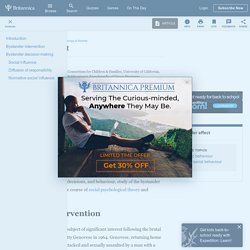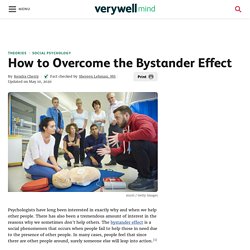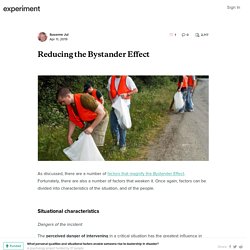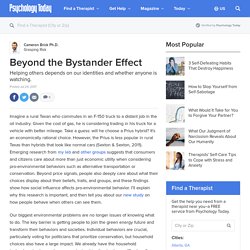

THE BYSTANDER EFFECT. Collapsing in Public - The Bystander Effect (Social Experiment) THE BYSTANDER EFFECT. What Is the Bystander Effect? Bystander effect. Bystander effect, the inhibiting influence of the presence of others on a person’s willingness to help someone in need.

Research has shown that, even in an emergency, a bystander is less likely to extend help when he or she is in the real or imagined presence of others than when he or she is alone. Moreover, the number of others is important, such that more bystanders leads to less assistance, although the impact of each additional bystander has a diminishing impact on helping. Investigations of the bystander effect in the 1960s and ’70s sparked a wealth of research on helping behaviour, which has expanded beyond emergency situations to include everyday forms of helping. The bystander effect - Economic and Social Research Council. How to Overcome the Bystander Effect. Psychologists have long been interested in exactly why and when we help other people.

There has also been a tremendous amount of interest in the reasons why we sometimes don't help others. The bystander effect is a social phenomenon that occurs when people fail to help those in need due to the presence of other people. In many cases, people feel that since there are other people around, surely someone else will leap into action.1 While the bystander effect can have a negative impact on prosocial behavior, altruism and heroism, researchers have identified a number of different factors that can help people overcome this tendency and increase the likelihood that they will engage in helping behaviors.2 Some of these include: Reducing the Bystander Effect. As discussed, there are a number of factors that magnify the Bystander Effect.

Fortunately, there are also a number of factors that weaken it. Once again, factors can be divided into characteristics of the situation, and of the people. Situational characteristics Dangers of the incident. The Bystander Effect! (And Why We Must Learn to Overcome it) Overcoming the Bystander Effect. Have you ever been a hero? Going about our daily routines, few of us have the opportunity to save a life or disrupt a crime in progress—fewer still take that opportunity when it presents itself. I once witnessed a car accident in which the guilty party leapt from his disabled vehicle and fled the scene. I quickly pulled over and dialed 911. Beyond the Bystander Effect.
Imagine a rural Texan who commutes in an F-150 truck to a distant job in the oil industry.

Given the cost of gas, he is considering trading in his truck for a vehicle with better mileage. Take a guess: will he choose a Prius hybrid? It's an economically rational choice. However, the Prius is less popular in rural Texas than hybrids that look like normal cars (Sexton & Sexton, 2011). Emerging research from my lab and other groups suggests that consumers and citizens care about more than just economic utility when considering pro-environmental behaviors such as alternative transportation or conservation.